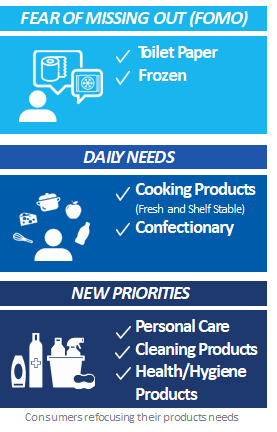The COVID-19 crisis has impacted governments, industries and consumers alike, and now that the dust has started to settle after the initial volatility, now is the time to start planning for the ‘new normal’. Retailers need to adapt their strategy to this post-pandemic environment and redefine the role that their Private Brand has to play within their categories.

 The COVID-19 crisis has impacted governments, industries and consumers alike, and now that the dust has started to settle after the initial volatility, now is the time to start planning for the ‘new normal’. Retailers need to adapt their strategy to this post-pandemic environment and redefine the role that their Private Brand has to play within their categories.
The COVID-19 crisis has impacted governments, industries and consumers alike, and now that the dust has started to settle after the initial volatility, now is the time to start planning for the ‘new normal’. Retailers need to adapt their strategy to this post-pandemic environment and redefine the role that their Private Brand has to play within their categories.
A look at consumption behaviours following the initial surge in UK stockpiling indicated that sales were impacted positively, driven by FOMO, daily needs and new priorities.
According to IRI and BCG, cleaning products such as deodorant and personal wash were up by 40.9% and 26.3% respectively for the week ending April 12, 2020 versus the comparative spend a year ago.
Cooking products were also up by 45.5% highlighting the home cooking trend – this can be seen by the gaps on shelves for eggs and flour, not to mention the activity seen on social media. The lockdown has also created new eating patterns at home, consumers are having to cook at home, as on-the-go and eating out are no longer an option. By default, retail has had to keep up.
To succeed retailers must review and understand these developments in order to meet consumer’s needs.

The unprecedented demand and resulting availability issues have caused many challenges, including questions over the origin of certain products. It’s also resulted in changes to retailer-supplier relationships with alternate sources investigated – some products that are usually produced abroad are having to be sourced locally to ‘plug the gap’ in supply.
Consumers have had to become more promiscuous, shopping at different stores to get what they need, with local convenience being big winners. According to Kantar, while larger stores continue to supply the majority of Britain’s food and drink, smaller stores are thriving as people shop closer to their homes with proximity being the key decision factor. Loyalty and trust are therefore assets to capitalise on.
With customers making limited shopping trips and trying to spend less time in stores, ensuring stock of customer essentials and favourites is vital to customer satisfaction, so avoiding supply chain issues are more important than ever! It is therefore vital to have a robust, reliable supply chain, one that allows flexibility to react to change.
The availability of Private Brand products should be a focus area – it’s a retailer’s USP and brings customer loyalty.
Read the full article HERE






